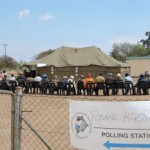28th October 2015 Gaborone, Botswana
A year after the Botswana 2014 General Elections: A personal experience
A year ago, with election fever gripping the country, and conscious of Botswana’s sound democratic principles and wanting to experience and test them, I left my house in Gaborone at 05:00 so I could be at the opening of a polling station in Lobatse. What immediately struck me was the long queue of citizens, women and men, from all social backgrounds and ages, patiently waiting to act on their electoral right. All were smartly dressed and waiting patiently, chatting away to each other. Once they had voted, they resumed their conversations – it was a social day out for them as much as it was their civic duty to vote. Helping set the calm atmosphere were the local and international observers. There was almost an opening ceremony to proceedings when the Independent Electoral Commission staff opened and showed the empty ballot box to everyone just before the official opening.
I had decided to go outside Gaborone to check the pulse of the nation beyond the capital and spent the day with Anney Aves (my PA) driving around Lobatse, Goodhope and Hebron. This seemed to me to be a good mix of urban, semi-urban and rural areas. We stopped for a late picnic breakfast under a tree having made sure there was no one around for miles. Within minutes, we were giving some of our snacks away. The day speed by and ended with us watching the count unfold back at Lobatse (after an excellent dinner at the Cumberland Hotel). I got back home at 23:00. Tired but enthused and exhilarated.
We did not have an official observation mandate which meant there was no report to write, but we were officially invited to observe proceedings as were our other diplomatic colleagues. We coordinated our activities and covered more than 20 constituencies. This gave us a good idea how the electoral process was conducted, from voting to counting and the announcement of the results.
What were my conclusions? Nothing but positives and plaudits. We were all impressed by what we saw. The process was efficient, smooth and transparent. There was little doubt about the credibility of the process and the enthusiasm of all Batswana, whether voters, IEC officials, police and party officials was plain to see. In short, the election process was exemplary and I congratulate the people of Botswana, and especially the IEC, for that.
But there was in my opinion a blip after the results were announced, namely the furore surrounding the voting method to be used in Parliament. Without doubt, the strength of the rule of law in the country was tested during those days. But the final outcome demonstrated the strength and impartiality of Botswana’s judicial system. Just as Botswana was about to score an own goal, it saved the day and the rule of law won. The outcome and the respect of the decision demonstrated how strong and deeply ingrained this principle is in Botswana.
But there is always room for improvement and lessons to be learned. One year from the election, and four years before the next, it’s a good moment to take stock, reflect and see how the system can be improved. I would recommend anyone interested in this topic to read the final report of the African Union Electoral Observation Mission. Suggestions for improvement include the speeding up of the counting process, e.g. by introducing electronic voting as Namibia and other countries in Africa have. The issue of public funding of political parties also, in my opinion, need looking at.
More broadly, the statistics show that women were still underrepresented and their participation in the political sphere remains low. To raise awareness of this, and in looking to assist local initiatives to help promote this cause, we supported a workshop in September 2015 with participants from the BDP, BCP and UDC under the banner of Women in Politics.
After nearly three years here, I remain deeply impressed by the strength of Botswana’s democratic platform. But development should be continuous and I urge all stakeholders, i.e. every Batswana, to get involved and ensure the impressive gains made over the last 49 years are built upon.
